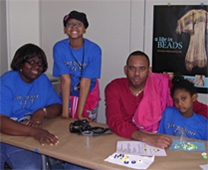Grant Spotlight | December 1, 2008
Share This |
Recipients: Pictured: |
Grant: Contact: |
||
The nomadic lifestyle of military families can take a toll on children’s education. To boost the school performance of 1,499 elementary school students at Fort Belvoir Military Post in Fort Belvoir, Virginia, three libraries in Fairfax County launched Project ExCELLS (Excellence Coalition for Education, Literacy and Library Services). Working together, the library staff has instituted myriad library and literacy programs for both the students and their parents. The project was funded by IMLS under a 2007 National Leadership Grant for Libraries and will serve as a national model for organizations that serve transient groups.
"We take a ‘more cowbell’ approach and throw as much as we can at the students, in terms of library and literacy services, because we only have them for a short period. It’s intense and takes a lot of effort, but it works. We use anything, anybody, any resource we can," said Lory Monaco-Stevenson, a librarian at Fort Belvoir Elementary School (FBES) who directs Project ExCELLS with FBES librarian Ursula Reilly.
In addition to the school, Project ExCELLS members include Richard Freeman, a librarian at Van Noy Army Library on the Post, and Linda Masnik, branch director of the Kingstowne Public Library, located just outside the post. The librarians were determined to offer military families a complete array of library services and programs, which became increasingly difficult after the September 11, 2001, terrorist attacks and subsequent security measures.
One of the coalition’s first priorities was to raise the scores on standardized reading tests taken by third graders. In 2000, Fort Belvoir third-grade students achieved a pass rate of 70 percent compared to a 78 percent pass rate of non-military Fairfax County students. With help from Project ExCELLS, FBES’s third-grade pass rates in 2008 soared to 83 percent compared to 88 percent achieved by Fairfax County school students.
Last summer, children were not only reading better, they were enjoying it more, said Monaco-Stevenson. Coalition participants rang a cowbell to call children living on the post to the book van. Children thronged to the designated spots where they selected free books, listened to stories, and snacked on popsicles and lollipops. The summer program and book van was operated by 12 library interns from the University of Virginia who earned school credit for researching, purchasing, processing, cataloguing, and delivering the most popular children’s books.
"It was a peak experience to know that the kids were reading over the summer," said Monaco-Stevenson. "The school principal rode along in the van and met new families. The reading teacher also rode with us. When we came to a stop, she’d open up her lawn chair and start reading to the kids." The summer reading program was a roaring success as were other Project ExCELLS "cowbells," including:
- A preschool literacy component that teaches parents reading strategies to use with their children. Free books were given away to all families in attendance.
- Programs about the history of dance, Native Americans, robots, the ride of Rosa Parks, The Legend of Sleepy Hollow and visits from award-winning authors at the school and the Van Noy library.
- Family field trips to Jamestown, Williamsburg, museums in Washington, D.C., including both of the Smithsonian’s air and space museums and the National Museum of the American Indian, the national Christmas tree lighting, Busch Gardens, and a "teaching" ride on the Washington Metro system.
- After-school homework help, reading help, and literacy help for at-risk and "almost at-risk" children. Certified teachers worked with very small groups to assess, address, and challenge students in need.
- Book clubs to encourage a love of reading and give students and families a chance to sit around and just chat about a good story. Certified reading teachers led book discussions in a no-stress/no-test atmosphere, with open discussions, refreshments, and free books to participants.
"Project ExCELLS makes learning fun and interesting for students and their families!" said Jane Wilson, FBES principal. "I strongly feel that part of our success in meeting the standards set by No Child Left Behind can be attributed to the support of EXCELLS through our summer book van, cultural assemblies, homework and book clubs, as well as our literacy activities with parents."
"We want to keep the project going after the grant funding ends," declared Monaco-Stevenson, noting that many issues contribute to FBES’s ongoing need for literacy services. Mobility is one of the biggest factors: 35 percent of FBES students move to a new school between September and June compared to 15 percent mobility in students from non-military Fairfax County schools. Poverty plays a role too. Approximately 39 percent of FBES students receive free or reduced price lunches. In addition, FBES has a large student population with medical issues. Students with conditions ranging from asthma to sickle cell anemia attend Fort Belvoir Elementary. Families with sick children can request a move to Fort Belvoir post in order to take advantage of its easy access to military hospitals in Bethesda, Maryland, and Washington, DC.
In late 2009, Project ExCELLS staff will issue a playbook of how libraries and schools can partner to serve transient groups. This playbook will be especially useful to schools and libraries that work with migrant farm workers, minority populations who are moving to find affordable housing, and people affected by natural disasters like Hurricane Katrina.
"We combined the public, base, and school libraries to enhance the literacy skills of students and offer them a triple service in a sense," Monaco-Stevenson said. "We have exposed them to the best services in the libraries in the short time that they’re here."
